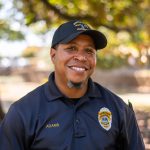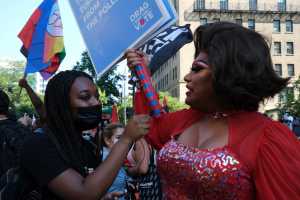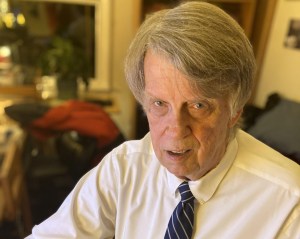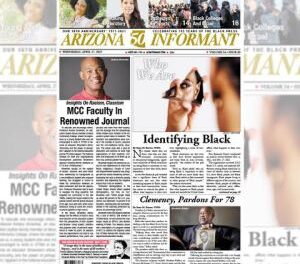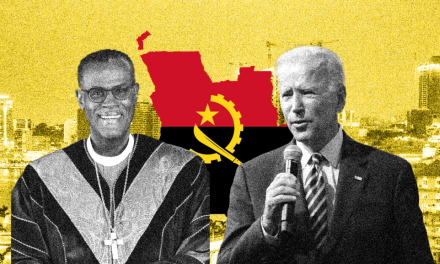Birmingham Police Department (BPD) Corporal Clarence Adams Jr. is part of a collaboration between the BPD and One Roof, the coordinating agency for the homeless Continuum of Care of Central Alabama. (Amarr Croskey, For The Birmingham Times)
” data-medium-file=”https://www.birminghamtimes.com/wp-content/uploads/2023/11/lede-300×194.jpg” data-large-file=”https://www.birminghamtimes.com/wp-content/uploads/2023/11/lede-1024×662.jpg” />
By Ryan Michaels
The Birmingham Times
Clarence Adams Jr. remembers the day his father quit a well-paying job as a hotel manager. The older brother to three sisters, Adams, age 14 at the time, couldn’t understand why his father would decide to ditch his livelihood to run a shelter for homeless people.
“I asked him, ‘Why did you leave there, making good money, to do this?’” Adams recalled. “[He said], ‘I sleep so much better at night knowing I’ve made a difference. The money is irrelevant.’”
From that point on, Adams spent his summers building that same love for work, as he assisted his father at Ozanam Inn, the largest homeless shelter in New Orleans, Louisiana.
Today, Birmingham Police Department (BPD) Corporal Adams is one of two officers working on Project HOPE (Homeless Outreach and Police Engagement), a collaboration between the BPD and One Roof, an organization dedicated to “[equipping and empowering] our community to prevent and end homelessness through advocacy, education, and coordination of services,” according to OneRoofOnline.com.
“Be Polite”
After signing onto the project in 2020, Adams said he worked with One Roof’s outreach team, following them out to various places where homeless residents of the city tended to gather, such as encampments in parks.
In that time, Adams found that many homeless residents were unaware of the organizations that provide resources like food and access to phones or shelter, so he started putting together his own packets of information.
After following along with the One Roof outreach team for about a year, Adams started to do the same work, independent of the team. Each day, he works directly with Birmingham’s homeless residents, particularly, “trying to change the way police interact with our homeless community.”
When first embarking upon his own outreach work, establishing trust was critical. Adams said he has built that through persistence and politeness.
“Somebody can be having the worst day of their life, but you can change their entire outlook on the rest of their day if you smile and are polite,” the BPD officer said. “Be polite, be friendly, and the word gets around.”
Additionally, Adams informs people at encampments that he is approaching well before they see his badge: “I yell out from far away, ‘Hey, this is Officer Adams with the [BPD]. Nobody’s in trouble. I’m coming to check on y’all and see if I can help y’all in any way.’”
On a given night in Birmingham, 847 are homeless and 465 are sheltered, according to oneroofonline.org. Those numbers include 100 homeless veterans consisting of 32 who are not in shelters; and 35 homeless families consisting of 99 individuals.
Adams first moved to Birmingham in 2017, when his wife, Angela, an employee of the U.S. Army Corps of Engineers, was promoted and relocated to the city. After arriving in the Magic City, Adams started looking for a law enforcement position. When he started with the BPD that year, he became a field training officer and continued in that role until 2020, when he learned that the department wanted someone to collaborate with One Roof.
“I thought it would be a good fit for me, a chance to actually change some lives,” Adams said.
Street Outreach
One Roof serves Jefferson, Shelby, and St. Clair counties, meaning the street outreach team has a lot of ground to cover, said Michelle Farley, executive director of One Roof since 2003: “That means all of the woods, all of the abandoned buildings that we can actually access.”
Members of the outreach team are in place to identify the “most vulnerable” homeless residents, meaning the people who are most likely to remain homeless, incur the highest cost for other residents, or “die on the street,” Farley said.
“By our definition, ‘most vulnerable’ means those who are living on the streets, in their cars, in the sewer tunnels, in abandoned buildings, or in places otherwise unfit for human habitation,” she added.
After finding the “most vulnerable,” the street outreach team establishes communication, which has many of its own difficulties, Farley said.
“We have people who’ve been on the streets so long, and they have such disabling conditions [that] they can’t communicate any longer. Literally, they cannot tell us their name. They have no concept why they live on the street,” Farley said.
Being able to get that basic information from homeless residents is critical to being able to connect them to needed resources. Still, Farley is often uncomfortable sending her street outreach team to certain areas alone because some homeless residents dwell in dangerous places, especially given the prevalence of drug addictions among the homeless population.
Near the end of 2020, Farley suggested a partnership between law enforcement and One Roof to expand the services provided by the organization’s outreach team. She set up meetings between the street outreach team and BPD officers and conducted group training focused on crisis intervention and trauma-informed care.
The One Roof outreach team was already familiar with many of the training topics, but the police officers helped the One Roof team build a stronger understanding of “situational awareness.”
“While the outreach team had a whole lot of social justice [training], they needed caution, for example, about running into a crack house without thinking twice, and the police officers really taught them a thing or two,” Farley said.
It didn’t take long for the officers and members of the One Roof street outreach team to get along.
“As soon as my team got to know the officers, and once they saw them interacting with people on the street, they understood that these were not the kind of officers that sat on citizens’ necks,” Farley said.
That’s where officers like Adams have been helpful.
“Maybe [some homeless residents] wouldn’t listen to us, but if we went back and asked Officer Adams to go with us, they’d listen to him,” Farley said.
Hard Work
Adams, who was born in New Orleans to Clarence Sr. and Theresa, said his parents both “worked their butts off.” While his mother was a nurse, his father spent a significant amount of his career as the general manager for a luxury hotel.
“I never knew I was poor,” said Adams. “I always had everything I needed, not necessarily everything I wanted. [My parents] were always at work.”
After Adams’ father took over Ozanam Inn, Adams enjoyed working at the shelter in the summers.
“I got to hang out with my dad and go to work with him, which I thought was the coolest thing ever, to get to talk to all these interesting people and learn a lot of lessons early on,” the BPD corporal said.
Three days after graduating from Thurgood Marshall High School in New Orleans, Adams joined the U.S. Marine Corps and started his career as a reservist. In his 18 years of military service, he was deployed to Iraq twice.
Adams learned a lot about relating to people dealing with homelessness after Hurricane Katrina flooded his hometown. When the storm hit in the summer of 2005, Adams was working for a security company named Paragon, an experience that gave him a unique perspective about the type of work he does today.
“It still bothers me when I visit [New Orleans] because it’s not the same,” said Adams. “A lot of people say, ‘You can relate because you were homeless after Katrina.’ Yeah, pretty much. I had a little money squirreled away, but, yeah, I lost everything.”
For more on One Roof, visit OneRoofOnline.com.

